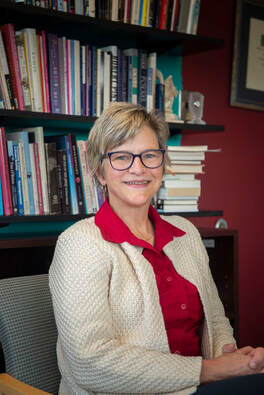
By Kathleen O’Shea, Professor of English at Monroe Community College in Rochester, New York
At 55, my headache specialist, who had been a constant for me for 16 years--always there to help, encouraging me that if one medication or treatment didn’t work, we’d find another-- had retired, and I found myself in an intractable migraine cycle, which had already lasted for two months. I felt desperate, as there were/are few headache specialists in my area (Rochester, NY.), and they were over-booked already. I was lost, floundering, in pain, trying to keep working (teaching) at my best, but knowing something had to shift.
I decided to do what I’d always done when in pain (physical or psychological), and that was to turn to literature, since it invites the reader in to know he/she is not alone. In fact, I decided shortly after that, others needed to benefit from what I already knew: imaginative literature can give voice and insight into life experiences that find no outlet in any other way. The subjective and imaginative experiences that we often find difficult to describe, at least in ways that aren’t clinical and objective, are shared beautifully through poetry, fiction, plays, and non-fiction.
Literature taps another kind of resource for migraineurs and those seeking more understanding--the written testimony of essayists, fiction writers, poets, and dramatists, all who give eloquent, often passionate and harrowing accounts of multiple features of migraine that go beyond the pain of the fierce headache itself. The multiple sensations and symptoms of migraine, which capture the consuming pain, exhaustion, confusion, nausea, cognitive problems, and overwhelming fatigue and isolation that often accompany the disease, differs from patient to patient in some ways, but one of the predominant frustrations migraineurs share is a feeling that no one knows what migraine disease really feels like.
The migraine experience is often invisible because the symptoms, unlike a physical trauma, are often not apparent to a casual observer; the stigma remains. The migraineur attempts to function in his or her life and often becomes good at masking all of the other symptoms in order to achieve some measure of outward normalcy. People have trouble understanding how excessive yawning, confusion, irritability, crying, cognitive blanks, and heightened sensory awareness (smells, light) can all be attributed to a simple “headache.”
I knew, at this point, I needed to dig deeply to discover some of the best literature that could reach migraineurs in a number of ways: I chose the themes of the experience of migraine, the invisibility of migraine, the stigma that it’s just a headache, the reality that coping with this disease is a full-time, life-long job, and what migraineurs experience when it’s gone. In exploring these familiar themes migraineurs share, I developed a passion for learning about the disease, and, insofar as possible, “mastering” the condition through a self-understanding that I can share with readers. As a professor of literature, I have access to and have identified a large body of material on this subject that spans some four hundred years, from and 18th century poem to recently published novels, plays, and poetry.
Professionals in the field of migraine testify that there is a “hunger” for information on the subject, and while the internet and blogs can be useful, what they offer is often piecemeal and sometimes contradictory. I wrote So Much More than a Headache: Understanding Migraine through Literature, which provides an organized and sustained resource that is different in kind from other sources. Through contact with professional writers, migraineurs will find affirmation that they don’t experience this disease alone. Family, friends, and co-workers will better understand and empathize with the people they care about and work with.
Medical professionals and other groups trying to understand migraine will find in this anthology texts that can become invaluable starting points for discussion of the disease and the patients suffering with it. Finally, while I still suffer chronic migraine, I feel I am giving something to others. I have greatly benefited from researching and writing the book, and I hope to get it into the hands of whose who really need it.
1 Comment
Ann Tippett
10/20/2020 06:07:24 am
Thank you for such an important reminder of the power of art to heal, if not the body, for sure the soul
Reply
Leave a Reply. |
Posts and advice from doctors to patients
|